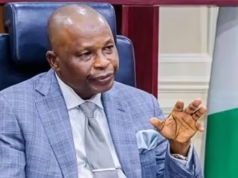At the inaugural West Africa Economic Summit (WAES) in Abuja, policymakers, business leaders, and regional influencers gathered under a powerful banner: digital identity infrastructure is emerging as the cornerstone for unlocking West Africa’s astonishing $166 billion trade opportunity.
Despite the region’s vast resources and youthful population, intra‑regional trade remains unusually low. In 2024, just 8.6 percent of the region’s $166 billion in exports circulated within West Africa, a stark contrast to better-integrated blocs like the European Union. Leaders at WAES argued that the major barrier is not geography or capacity, but identity.
Table of Contents

Why Digital Identity Matters
Dr. Abisoye Coker‑Odusote, Director‑General of Nigeria’s National Identity Management Commission (NIMC), delivered a keynote that reframed the debate: “Digital identity is not just infrastructure. It is the nervous system of a modern regional economy.” Without verifiable, interoperable identity systems, traders remain invisible, especially women, youth, and informal sector participants who drive the bulk of real commerce.
Nigeria has already registered over 120 million citizens under its National Identification Number (NIN) scheme; Ghana, Côte d’Ivoire, and Senegal have made significant strides with biometric systems. Yet countries like Guinea, Sierra Leone, and Liberia lag in coverage and system alignment, weakening cross‑border trust and blocking access to financial services and formal markets.
A regional digital ID ecosystem would make the informal formal, reduce fraud, unlock credit through mobile wallets, and enable seamless trade verification across borders. Put simply, identity becomes capital.
Regional Vision: Beyond National Systems
Nigeria’s Foreign Minister Yusuf Maitama Tuggar painted a compelling historical arc: centuries before modern states, markets in Salaga, Katsina, and Kano thrived through trust and human networks. Yet despite shared history, West Africa’s modern orientation favors external markets over each other—most trade flows outside the region, perpetuating dependency.
At WAES, Tuggar and other ministers urged stakeholders to embrace a regional economic vision, anchored in infrastructure like digital ID, transport corridors, power pooling, and value‑chain integration. The goal: drive intra‑regional trade from current levels toward more than 50 percent of regional exports within five years.
Five Pillars for a Pan‑West African ID System
Coker‑Odusote outlined a detailed roadmap:
- Governments must treat identity as essential infrastructure, budgeting for it and embedding ID into trade and finance policies.
- Identity agencies—from Nigeria’s NIMC to Ghana’s NIA—must synchronise technical standards and protocols.
- ECOWAS and WAEMU should establish a permanent West Africa Digital Identity Charter and empower a task force.
- Private sector firms, especially banks and fintechs, need to integrate regional ID verification into onboarding, payments, and lending.
- Civil society and traditional leaders must lead grassroots campaigns to build trust, literacy, and inclusion, especially among women and informal traders.
In practice, this means bridging modern digital systems with local realities—ensuring identity systems reach rural traders, informal workers, and the digitally unbanked.

From Summit to Action
Stakeholders at WAES emphasised that words must become deeds. Patrick Ayang Macdonald of Biometric Update summarised the mood: “West Africa wants to move from speeches to action on interoperable digital ID.” Nigeria’s President Bola Tinubu echoed that commitment, urging accelerated investment in digital infrastructure and policy coordination across borders.
Panels on regional mobility called for a Schengen‑style visa among coastal states and the use of national ID cards instead of passports for short‑distance cross‑border travel, opening tourism, trade, and cultural exchange. A unified payments system was also advocated, aligned with the Pan‑African Payment and Settlement System (PAPSS) under AfCFTA.
Digital ID as the Trust Layer for AfCFTA
The African Continental Free Trade Area (AfCFTA), operational since April 2024, provides a tariff‑reducing trade framework, a Pan‑African payments mechanism, and an online observatory to monitor non‑tariff barriers. But these systems depend on the ability to verify who you are, across borders, digitally, and securely.
Without interoperable identity systems, AfCFTA risks being a paper promise rather than a connector. Digital ID acts as the trust layer beneath trade, onboarding, finance, logistics, and beyond.
Standardisation experts across the continent back this vision. Over 70 percent of African countries have national databases with biometric features, but only a fraction operate in an interconnected or legally harmonised manner. The African Union’s Interoperability Framework and regional programs like WARDIP propel ongoing efforts toward unified identity and regulation ecosystems.
Real‑World Benefits: Trade, Inclusion, Investment
A harmonised identity system can transform everyday economic life: cross‑border traders gain access to bank accounts, credit, and mobile money; fintech firms can better serve new customers; governments can deliver social services with precision; and logistics players can trace payments and flow with confidence.
At the summit, discussions referenced India’s Aadhaar and Estonia’s e‑ID systems—successful models where digital identity fuels national financial inclusion, efficient governance, and trust in digital markets.
For West Africa, the payoff could be seismic: lifting informal traders into the formal economy, lifting trade penetration, and turning fragmented markets into a digital single market powered by trust.
Companies like Africa Global Logistics are already investing in infrastructure to catalyse trade. With plans to spend €60 million over five years on logistics hubs in Abidjan, Bouaké, Ferkessédougou, and San Pedro, the firm is scaling inland operations to support trade among landlocked neighbours like Burkina Faso and Mali. Such physical infrastructure must be matched by digital scaffolding—trustworthy identity systems to power the numbers and network.
Challenges Remain—but the Window Is Now
Several obstacles stand in the way: uneven national coverage, legal fragmentation, political alignment, and data privacy concerns. Countries still treating identity systems as technical or symbolic miss the point: identity is economic infrastructure.
Differences in national approach—between high‑coverage systems in Nigeria or Ghana, and low‑coverage ones in Sierra Leone or Liberia—threaten cross‑border interoperability. Without alignment, verifying a trader from Guinea becomes a costly, ambiguous exercise.
Further, without legal harmonisation, issues of data protection, consent, and cross‑border identity sharing become regulatory quagmires. That’s why ECOWAS‑led working groups and legal frameworks are critical.

Conclusion
As WAES ended, consensus was clear: digital identity infrastructure is not just a digital policy—it is the foundation for building an integrated West Africa, capable of self‑reliant trade, inclusive growth, and deeper regional unity.
If properly executed—backed by funding, legal frameworks, private‑sector integration, and grassroots trust—the region stands to transform over the next five years. From just 8–15 percent intra‑regional trade in 2024 to potentially over 50 percent by 2030, identity is the gateway.
In the words of Dr. Coker‑Odusote: “When citizens can move across borders with a recognised and verifiable identity, they can trade, access services, and participate meaningfully in regional growth.”
Digital identity is not just a scheme—it is a promise: of visibility, trust, inclusion, and ultimately, prosperity.
Join Our Social Media Channels:
WhatsApp: NaijaEyes
Facebook: NaijaEyes
Twitter: NaijaEyes
Instagram: NaijaEyes
TikTok: NaijaEyes





